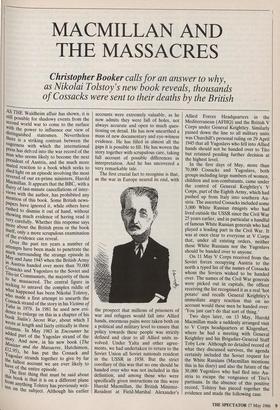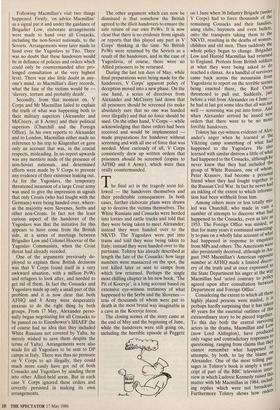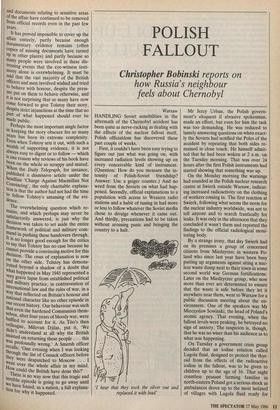MACMILLAN AND THE MASSACRES
Christopher Booker calls for an answer to why,
as Nikolai Tolstoy's new book reveals, thousands of Cossacks were sent to their deaths by the British
AS THE Waldheim affair has shown, it is still possible for shadowy events from the second world war to come to the surface with the power to influence our view of distinguished statesmen. Nevertheless there is a striking contrast between the eagerness with which the international press has delved into the war record of the man who seems likely to become the next president of Austria, and the much more muted reaction to a book which seeks to shed light on an episode involving the most revered of our ex-prime ministers, Harold Macmillan. It appears that the BBC, with a flurry of last-minute cancellations of inter- views with the author, has prohibited any mention of this book. Some British news- Papers have ignored it, while others have rushed to dismiss it out of hand, without showing much evidence of having read it very carefully. Whether this response says more about the British press or the book itself, only a more scrupulous examination of the evidence can reveal. Over the past ten years a number of attempts have been made to penetrate the murk surrounding the strange episode in May and June 1945 when the British Army in Austria handed over more than 70,000 Cossacks and Yugoslays to the Soviet and Tito-ist Communists, the majority of them to be massacred. The central figure in seeking to unravel the complex riddle of what happened has been Nikolai Tolstoy, Who made a first attempt to unearth the Cossack strand of the story in his Victims of Yalta in 1978. In 1981 he used new evi- rdence to enlarge on this in a chapter of his Dock Stalin's Secret War, about which I wrote at length and fairly critically in these columns. In May 1983 in Encounter he added part of the Yugoslav strand of the story_ And now, in his new book (The Minister and the Massacres, Hutchinson, !'2.95) he has put the Cossack and Yugoslav strands together to give by far have fullest account we are ever likely to nave of the entire episode. The first thing that must be said about from book is that it is on a different plane tr, om anything Tolstoy has previously writ- ten on the subject. Although his earlier accounts were extremely valuable, as he now admits they were full of holes, not always accurate and open to much ques- tioning on detail. He has now unearthed a mass of new documentary and eye-witness evidence. He has filled in almost all the gaps it is possible to fill. He has woven the story together with scrupulous care, taking full account of possible differences in interpretation. And he has uncovered a very remarkable tale. The first crucial fact to recognise is that, as the war in Europe neared its end, with the prospect that millions of prisoners of war and refugees would fall into Allied hands, enormous pains were taken both on a political and military level to ensure that policy towards these people was strictly defined and clear to all Allied units in- volved. Under Yalta and other agree- ments, we had undertaken to return to the Soviet Union all Soviet nationals resident in the USSR in 1938. But the strict corollary of this was that no one should be handed over who was not included in this definition, and among those who were specifically given instructions on this were Harold Macmillan, the British Minister- Resident at Field-Marshal Alexander's Allied Forces Headquarters in the Mediterranean (AFHQ) and the British V Corps under General Keightley. Similarly passed down the line to all military units was Churchill's personal ruling on 29 April 1945 that all Yugoslays who fell into Allied hands should not be handed over to Tito but retained pending further decision at the highest level.
In the first days of May, more than 70,000 Cossacks and Yugoslays, both groups including large numbers of women, children and non-combatants, came under the control of General Keightley's V Corps, part of the Eighth Army, which had pushed up from Italy into southern Au- stria. The assorted Cossacks included some 3,000 White Russian emigres who had lived outside the USSR since the Civil War 25 years earlier, and in particular a handful of famous White Russian generals who had played a leading part in the Civil War. It was at once clear to everyone at V Corps that, under all existing orders, neither these White Russians nor the Yugoslays should be handed over to anyone.
On 11 May V Corps received from the Soviet forces occupying Austria to the north a typed list of the names of Cossacks whom the Soviets wished to be handed over. The names of the Civil War generals were picked out in capitals, the officer receiving the list recognised it as a real 'hot potato' and recalls General Keightley's immediate angry reaction that on no account would these men be handed over: `You just can't do that sort of thing.'
Two days later, on 13 May, Harold Macmillan made a suddenly arranged visit to V Corps headquarters at Klagenfurt, where he had a meeting with General Keightley and his Brigadier-General Staff Toby Low. Although no detailed record of what they discussed survives, the agenda certainly included the Soviet request for the White Russians (Macmillan mentions this in his diary) and also the future of the 30,000 Yugoslays who had fled into Au- stria to escape the vengeance of Tito's partisans. In the absence of this positive record, Tolstoy has pieced together the evidence and made the following case. Following Macmillan's visit two things happened. Firstly, 'on advice Macmillan' as a signal put it and under the guidance of Brigadier Low, elaborate arrangements were made to hand over all Cossacks, including the non-Soviet nationals, to the Soviets. Arrangements were later made to hand over the Yugoslays to Tito. There was no doubt that these handovers would be in defiance of policies and orders which could only be countermanded after pro- longed consultation at the very highest level. There was also little doubt in any- one's mind, as Macmillan's diary records, what the fate of the victims would be 'slavery, torture and probably death'.
Secondly, from that moment on, V Corps and Mr Macmillan failed to explain the truth of what was happening both to their military superiors (Alexander and McCreery, at 8 Army) and their political superiors (Churchill and the Foreign Office). In his own reports to Alexander and to London, Macmillan either made no reference to his trip to Klagenfurt or gave only an account that was, in the crucial respects, misleading. In no report upwards was any mention made of the presence of non-Soviet nationals, and determined efforts were made by V Corps to prevent any evidence of their existence leaking out. As for the Yugoslays, the temporary threatened incursion of a large Croat army was used to give the impression in signals that only Croats (who had fought with the Germans) were being handed over, where- as the majority were Slovenes, Serbs and other non-Croats. In fact not the least curious aspect of the handover of the Yugoslays was that the initiative for this appears to have come from the British side, at a series of meetings between Brigadier Low and Colonel Hocevar of the Yugoslav Communists, when the Croat threat had already receded.
One of the arguments previously de- ployed to explain these British decisions was that V Corps found itself in a very awkward situation, with a million PoWs and refugees to look after, and needed to get rid of them. In fact the Cossacks and Yugoslays made up only a small part of this problem and it is now clear that both AFHQ and 8 Army were desperately anxious to do the right thing by both groups. From 17 May, Alexander perso- nally began negotiating for all Cossacks to be passed on to Eisenhower's SHAEF (he of course had no idea that they included White Russians not covered by Yalta, he merely wished to save them despite the terms of Yalta). Arrangements were also made for all Yugoslays to be sent to DP camps in Italy. There was thus no pressure on V Corps to act illegally; they could much more easily have got rid of both Cossacks and Yugoslays by sending them into other Allied-held areas. But in each case V Corps ignored these orders and covertly persisted in making its own arrangements. The other argument which can now be dismissed is that somehow the British agreed to the illicit handovers to ensure the safe return of our own PoWs. It is now clear that there is no evidence from signals or reports that this played any part in V Corps' thinking at the time. No British PoWs were returned by the Soviets as a result of the handovers, and in the case of Yugoslavia, of course, there were no Allied prisoners to be returned.
During the last ten days of May, while final preparations were being made for the handovers, V Corps' apparent policy of deception moved into a new phase. On the one hand, a series of directives from Alexander and McCreery laid down that all prisoners should be screened (to make absolutely sure that no one was handed over illegally) and that no force should be used. On the other hand, V Corps — while acknowledging that these orders had been received and would be implemented made preparations for handover without screening and with all use of force that was needed. Most curiously of all, V Corps consistently drew up written orders that prisoners should be screened (copies to AFHQ and 8 Army), which were then orally countermanded.
The final act in the tragedy soon fol- lowed — the handovers themselves and their predictable consequences. In both cases, further elaborate plans were drawn up to deceive the victims themselves. The White Russians and Cossacks were herded into lorries and cattle trucks and told that they were being taken to meet Alexander; instead they were handed over to the NKVD. The Yugoslays were put into trains and told they were being taken to Italy; instead they were handed over to the partisans. Tolstoy has already described at length the fate of the Cossacks: how large numbers were massacred on the spot, the rest killed later or sent to camps from which few returned. Perhaps the single most chilling chapter in his new book, 'The Pit of Kocevje', is a long account based on extensive eye-witness testimony of what happened to the Serbs and the Slovenes tens of thousands of whom were put to death in the most brutal way imaginable in a cave in the Kocevje forest.
The closing scenes of the story came at the end of May and the beginning of June, while the handovers were still going on, including the horrible episode at Peggetz on 1 June when 36 Infantry Brigade (under V Corps) had to force thousands of the remaining Cossacks and their families, using clubs, bayonets and even bullets, onto the transports taking them to the NKVD, resulting in the deaths of women, children and old men. Then suddenly the whole policy began to change. Brigadier Low and Harold Macmillan had returned to England. Protests from British soldiers at what they were being asked to do reached a climax. As a handful of survivors came back across the mountains from Yugoslavia to report on the terrible scenes being enacted there, the Red Cross threatened to pull out. Suddenly, just before a visit from Alexander on 4 June he had at last got some idea that all was not well — screening was put into force. And when Alexander arrived he issued new orders that there were to be no more. forcible handovers.
Tolstoy has eye-witness evidence of Alex- ander's anger when he learned at the Viktring camp something of what had happened to the Yugoslays. He Os° learned with similar distress a little of what had happened to the Cossacks, although he never knew that they had included the group of White Russians, one of whom, Peter Krasnov, had become a personal friend when they had fought together in the Russian Civil War. In fact he never had an inkling of the extent to which inforMa- tion had been withheld from him. Among others more or less totally mis- led was Churchill, who made in vain a number of attempts to discover what had happened to the Cossacks, even as late as 1953. The Foreign Office was misled, s° that for many years it continued unwitting- ly to pass on a wholly false account of what had happened in response to enquiries from MPs and others. The Americans were also persistently deceived, although in Au- gust 1945 Macmillan's American opposite number at AFHQ made a limited discov- ery of the truth and at once expressed to the State Department his anger at the waY Macmillan had 'acted contrary to policY agreed upon after consultation between Department and Foreign Office'. Considering the extent to which all these i highly placed persons were misled, it is perhaps hardly surprising that it has taken 40 years for the essential outlines of this extraordinary story to be pieced together. To this day both the central surviving actors in the drama, Macmillan and Low, (now Lord Aldington), have produced only vague and contradictory responses to questioning, ranging from claims that they cannot remember what happened to attempts, by both, to lay the blame on Alexander. One of the most telling Pas- sages in Tolstoy's book is simply a trans- cript of part of the BBC television inter- view in which Ludovic Kennedy raised this matter with Mr Macmillan in 1984, incluo ing replies which were not broadcast. Furthermore Tolstoy shows how orders and documents relating to sensitive areas of the affair have continued to be removed from official records even in the past few years.
It has proved impossible to cover up the affair entirely, partly because enough documentary evidence remains (often copies of missing documents have turned up in other places) and partly because so many people were involved in these dis- tressing events that the eye-witness testi- mony alone is overwhelming. It must be said that the vast majority of the British officers and men involved wished and tried to behave with honour, despite the press- ure put on them to behave otherwise, and n is not surprising that so many have now come forward to give Tolstoy their story, despite strict injunctions at the time that no part of what happened should ever be made public. Perhaps the most important single factor in keeping the story obscure for so many years has been its extreme complexity. Even when Tolstoy sets it out, with such a wealth of supporting evidence, it is not a 'ways easy to digest or to follow — which is one reason why reviews of his book have been on the whole so scrappy and muted. When the Daily Telegraph, for instance, published a dismissive article under the headline 'Charge Against Macmillan Not C. onvincing', the only charitable explana- tion is that the author had not had the time to follow Tolstoy's amassing of the evi- dence.
The overwhelming question which re- mains, and which perhaps may never be satisfactorily answered, is just why the decision was taken to set aside the entire framework of political and military com- mand in pushing these handovers through. It is no longer good enough for the critics to say that Tolstoy has no case because he cannot provide a convincing motive for this decision. The onus of explanation is now on the other side. Tolstoy has demons- trated beyond a shadow of a doubt that What happened in May 1945 represented a very grave lapse from established political and military practice, in contravention of international law and the rules of war, in a way that reflected on Britain's honour and national character like no other episode in our recent history. Our behaviour was such that even the hardened Communists them- selves, after four years of bloody war, were baffled to account for it. As Tito's then colleague, Milovan Djilas, put it, 'We didn't understand at all why the British insisted on returning these people . . . this Was profoundly wrong.' A Smersh officer recalls: 'One evening when I was looking through the list of Cossack officers before they were despatched to Moscow . . . I went over the whole affair in my mind. How could the British have done this?' There is no way now that this tragic and terrible episode is going to go away until We have found, as a nation, a full explana- tion for why it happened.




















































 Previous page
Previous page